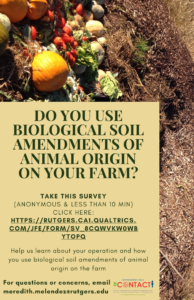This is the chance for eligible fresh fruit and vegetable growers to recover some of their expenses for implementing food safety practices on the farm.
For 2024:
- Applications are due between July 1, 2024 and January 31, 2025
- Eligible expenses must be between June 26, 2024 and December 31, 2024
For 2025:
- Application is due between January 1, 2025 and January 1, 2026
- Eligible expenses must be between January 1, 2025 and December 31, 2025
Eligible specialty crop operations can apply for FSCSC by working directly with the Farm Service Agency offices at your local FSA office for details. Applications will be accepted via mail, fax, hand delivery, or electronic means.
How the Food Safety Certification for Specialty Crops Program Works
The FSCSC program provides financial assistance for specialty crop operations that incur eligible on-farm food safety program expenses related to obtaining or renewing a food safety certification in years 2024 and 2025. This program helps offset costs to comply with regulatory requirements and market-driven food safety certification requirements. FSCSC will cover a percentage of the specialty crop operation’s cost of obtaining or renewing their certification, as well as a percentage of their related expenses.
Program Eligibility
Eligibility requirements for FSCSC applicants are outlined below. We recommend you review these requirements before initiating your FSCSC application.
To be eligible for FSCSC, an applicant must:
- Have obtained or renewed:
- 2024 food safety certification issued between June 26, 2024, and December 31, 2024
- 2025 food safety certification issued during calendar year 2025.
- Be a specialty crop operation (growing fresh fruits and vegetables); and meet the definition of a small business or very small business.
- A small (farm) business means an applicant that had an average annual monetary value of specialty crops the applicant sold during the 3-year period preceding the program year of more than $250,000 but not more than $500,000.
- A very small (farm) business means an applicant that had an average annual monetary value of specialty crops the applicant sold during the 3-year period preceding the program year of no more than $250,000.
| Category of Eligible Expenses | Payment Amount of Eligible Costs |
| Developing a Food Safety Plan for First Time Certification | 75% (no maximum) |
| Maintaining or Updating a Food Safety Plan | 75% up to $675 |
| Food Safety Certification | 75% up to $2,000 |
| Certification Upload Fees | 75% up to $375 |
| Microbiological Testing of Produce | 75% up to 5 tests |
| Microbiological Testing of Soil Amendments | 75% up to 5 tests |
| Microbiological Testing of Water | 75% up to 5 tests |
| Training Expenses | 100% up to $500 |
FSCSC payments are calculated separately for each category of eligible costs based on the percentages and maximum payment amounts. The FSCSC application and associated forms are available online at farmers.gov/food-safety.
You are encouraged to contact the Farm Service Agency office about FSCSC, program eligibility, or the application process. You may also call 877-508-8364 to speak directly with a USDA employee ready to provide one-on-one assistance.

